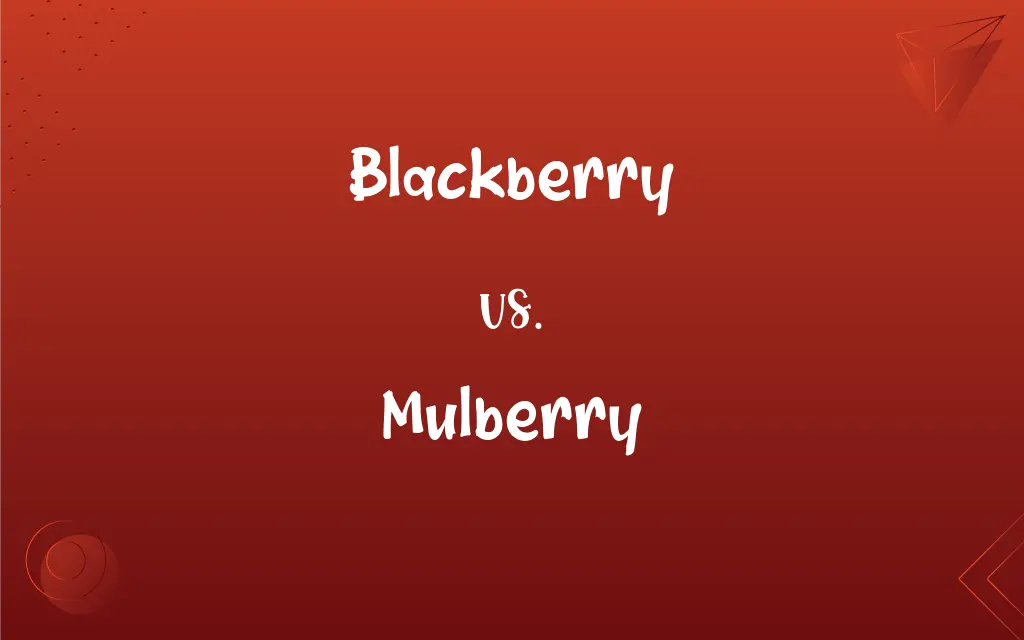Blackberry vs. Mulberry: What's the Difference?
Edited by Janet White || By Harlon Moss || Updated on October 14, 2023
Blackberries are usually dark purple-black, with a compound structure, while mulberries are typically red to dark purple, elongated, and smaller than blackberries.

Key Differences
Blackberry holds a prominent place in various culinary uses, especially in desserts and jams, and is recognized for its characteristic dark purple to black color and aggregate structure, comprised of multiple drupelets. Conversely, mulberry, often admired for its sweet and slightly tart flavor, tends to showcase a smoother, elongated form and presents colors ranging from red to dark purple or even black, depending on the species. Each berry is unique in its structural and color attributes, offering diverse options for culinary endeavors.
When focusing on their culinary uses, blackberry, with its sweet-tart essence, commonly graces kitchens globally, featuring in pies, jams, and as a fresh fruit offering. Mulberry, although less commonly utilized in widespread culinary applications due to its fragile nature, often finds itself spotlighted in jams, tarts, and wine, presenting a lusciously sweet and slightly tart profile that can elevate various dishes. The berries provide distinctive flavors, ensuring they hold irreplaceable spots in the culinary world.
In the context of cultivation, blackberries, members of the genus Rubus, often propagate through their perennating roots, showcasing thorny or smooth stems, while producing berries that mature to a rich, black color. On the other hand, mulberries belong to the Morus genus, demonstrating a tree form rather than a bush or vine and developing berries that transition from white or red to darker shades as they mature. Both the blackberry and mulberry plants demonstrate growth patterns and physical characteristics that distinctly classify them into their respective genera.
Looking at the nutritional aspect, blackberries are notably rich in vitamin C, fiber, and antioxidants, providing a healthy snack option and offering protective health benefits. Mulberries also hold their own in the nutritional arena, boasting an impressive lineup of vitamins C and K, iron, and notably, resveratrol, known for its potent antioxidant properties. Thus, while both blackberries and mulberries deliver a wealth of nutrients, they each offer their own unique health-promoting compounds, making them invaluable additions to a balanced diet.
In terms of their availability and utilization across various cultures, blackberries, widely accessible, have become ingrained in numerous cultural dishes, from European pies and North American cobbler to innovative modern cuisine. Mulberries, while enjoyed in many places globally, are particularly celebrated in Asian cuisines, where they are utilized in traditional medicines, food, and even sericulture, for silkworms primarily feed on mulberry leaves. The berries, while enjoyed worldwide, highlight their significance and cultural relevance, subtly differing between regions and practices.
ADVERTISEMENT
Comparison Chart
Color when ripe
Dark purple to black
Red to dark purple or black
Structure
Aggregate fruit, consisting of multiple drupelets
Single elongated berry
Plant Type
Often a bush, sometimes with thorns
Typically a tree
Culinary Use
Commonly used in various dishes and products
Less common due to its perishable nature
Common Cultivation
Widely cultivated globally
Common in Asia, but found worldwide
ADVERTISEMENT
Blackberry and Mulberry Definitions
Blackberry
The blackberry bush is a perennial plant that belongs to the Rubus genus, often with thorny stems.
Be cautious of the thorny stems while picking blackberries from the bush.
Mulberry
The mulberry tree, often found in regions of Asia, is not only valued for its fruit but also for its leaves, which are used in silk production.
Silk producers rely heavily on mulberry trees to feed their silkworms.
Blackberry
Blackberry, in a culinary context, often refers to flavoring or ingredients derived from the fruit used in various dishes.
Blackberry jam is a popular spread for bread and pastries.
Mulberry
The mulberry can symbolize wisdom and bounty in various cultural tales and traditions.
The ancient story tells of a wise old owl who lived in a grand mulberry tree.
Blackberry
A blackberry can also symbolize prosperity and abundance in certain cultural contexts and mythologies.
In the fable, animals avoided the blackberry bush due to its protective thorns.
Mulberry
A mulberry is a small, sweet fruit, commonly used in various culinary applications, that comes from the Morus tree.
She made a delicious pie using ripe mulberries from her garden.
Blackberry
A blackberry is a dark-black, juicy fruit, known for its sweet and slightly tart flavor.
She added fresh blackberries to the salad for a burst of flavor.
Mulberry
Mulberry, in a culinary sense, often implies a sweet, slightly tart flavor used in jams, wines, and desserts.
The mulberry wine complemented the dessert with its sweet and rich taste.
Blackberry
In technology, BlackBerry refers to a brand of smartphones and services developed by BlackBerry Limited.
His old BlackBerry device had a physical keyboard, distinct from modern touchscreens.
Mulberry
In historical contexts, the mulberry tree is often associated with silk production, specifically within China's sericulture industry.
For centuries, the Chinese have cultivated mulberry trees as a key element in their silk industry.
Blackberry
The fruit of these plants, usually black, purple, or deep red.
Mulberry
Any of several deciduous trees of the genus Morus, having unisexual flowers in drooping catkins and edible usually purple fruit.
Blackberry
Any of various shrubs of the genus Rubus in the rose family, having usually prickly stems, compound leaves, and an aggregate fruit of small drupelets.
Mulberry
The sweet fruit of any of these trees.
FAQs
Blackberries are a cherished culinary berry, popular in a multitude of sweet and savory dishes.
Packed with fiber and vitamin C, blackberries offer a nutrient-dense snack option.
Can you eat blackberries and mulberries raw?
Yes, both blackberries and mulberries can be enjoyed raw, provided they are ripe and have been washed.
Blackberries are an aggregate fruit, meaning they form from a single flower and contain multiple drupelets.
Some blackberry plants boast thorny stems, providing a natural deterrent to hungry animals.
Which is sweeter, blackberries or mulberries?
Mulberries tend to be sweeter and less tart than blackberries, which have a sweet-tart profile.
Why are blackberries sometimes avoided in wild foraging?
Blackberries can be avoided due to their thorny stems, making harvesting them a prickly task.
What are the health benefits of blackberries and mulberries?
Both are rich in antioxidants and vitamins. Blackberries are high in vitamin C and fiber, while mulberries contain iron, vitamin C, and resveratrol.
Do blackberries and mulberries change color as they ripen?
Yes, blackberries transition from red to black, while mulberries shift from green to white, red, or black, depending on the variety.
Can both blackberries and mulberries be used in baking?
Yes, both can be utilized in baking, though blackberries are more commonly used due to their availability and sturdier nature.
Are blackberries and mulberries safe for pet consumption?
In moderation, blackberries and mulberries can be safe for some pets, like dogs, but always consult with a vet first.
Is it difficult to cultivate blackberries at home?
Blackberries can be relatively easy to grow, requiring sun, well-drained soil, and some pruning.
Blackberries, due to their widespread cultivation, enjoy global availability and recognition.What is the main physical difference between blackberries and mulberries?
Blackberries are aggregate fruits with a black, glossy finish, whereas mulberries are elongated and can be white, red, or black when ripe.
What are the primary uses of mulberry trees in Asia?
Mulberry trees, particularly their leaves, are utilized in sericulture (silk production) and are also used in traditional medicines and culinary applications in Asia.
Can blackberries and mulberries be frozen for later use?
Yes, both berries can be frozen, although mulberries may lose some of their texture due to their delicate nature.
What is the best method to store blackberries and mulberries?
Both should be refrigerated and consumed quickly; mulberries are particularly perishable and best when eaten fresh.
Can blackberries and mulberries be juiced?
Yes, both can be juiced, but it’s worth noting that mulberries are often juicier than blackberries.
Are blackberries and mulberries seasonal fruits?
Yes, both berries are seasonal, typically harvested in late spring through summer, depending on the region.
Why are mulberries not commonly found in grocery stores?
Mulberries are very delicate and perishable, making transportation and storage challenging.
What are some popular dishes that use blackberries?
Blackberries are popular in pies, crumbles, jams, jellies, and smoothies, among other dishes.
How are mulberries utilized in culinary applications?
Mulberries are often used to make jams, jellies, desserts, and sometimes wines, due to their sweet flavor.
Are blackberries and mulberries used in alternative medicine?
Yes, various cultures utilize both berries in traditional and alternative medicine for their antioxidant properties.
Are blackberry and mulberry plants resistant to pests?
Both plants can attract pests. Blackberries are prone to issues like fruit flies, while mulberries can attract birds and silkworms.
Can you grow blackberries and mulberries at home?
Yes, both can be cultivated at home, considering you provide suitable growing conditions respective to each fruit.
About Author
Written by
Harlon MossHarlon is a seasoned quality moderator and accomplished content writer for Difference Wiki. An alumnus of the prestigious University of California, he earned his degree in Computer Science. Leveraging his academic background, Harlon brings a meticulous and informed perspective to his work, ensuring content accuracy and excellence.
Edited by
Janet WhiteJanet White has been an esteemed writer and blogger for Difference Wiki. Holding a Master's degree in Science and Medical Journalism from the prestigious Boston University, she has consistently demonstrated her expertise and passion for her field. When she's not immersed in her work, Janet relishes her time exercising, delving into a good book, and cherishing moments with friends and family.































































